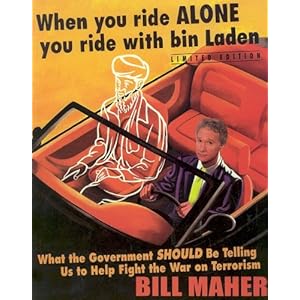
Probably the most frequently pundit-cited reason for reducing our use of hydrocarbons is the fact that much of our oil comes from a certain "volatile region of the world," and sales of oil by "them" to us benefit terrorists and tyrants. Pundits without an original thought in their heads typically gravitate towards this story, perhaps because it combines hobby-horses of the left (clean energy!) with hobby-horses of the right (Stick it to them Arabs!) Tom Friedman, who can always be relied upon for the shallowest deep thoughts around, gives us an example of the meme:
Sure, our opponents will scream ‘carbon tax!' Well what do you think you're paying now to OPEC? The only difference between me and my opponents is that I want to keep any revenue we generate here to build American schools, American highways, American high-speed rail, American research labs and American economic strength. It's just a little tick I have: I like to see our spending build our country. They don't care. They are perfectly happy to see all the money you spend to fill your tank or heat your home go overseas, so we end up funding both sides in the war on terrorism — our military and their extremists.
A carbon tax is an excellent idea. If you ever want to feel deeply shitty about supporting a cause you know is right, see if you can find an endorsement of it by Friedman. See also: the two-state solution.
A reviewer of Bill Maher's book, whose cover art is above, makes the same point in greater detail:
In World War II, there was a very famous poster of a man driving a car with a shadow of Adolph Hitler in the passenger seat. The caption was "When you ride ALONE you ride with Hitler! Join a Car-Sharing Club TODAY!" This was an appeal to save gasoline for the war effort and that every gallon of gasoline used was one less that could be used to fight the war. Maher makes the very valid point that it is just as true today as it was during World War II. The reason that American forces are fighting in the Middle East is because there is oil there and the Western nations need it to run their economies. If there was no oil or no need for it, hundreds of billions of dollars could be saved and we could care less what happens there.
The argument here is that by buying oil, we send money to the Middle East, and that money finds its way to terrorists, fueling extremism. But is that really true?
There are several problems with this argument. One is that for the most part, the governments benefiting from substantial oil revenues tend to be passionate enemies of terrorist organizations like Al-Qaeda. Syria, for example, responded to an uprising by the Muslim Brotherhood by leveling a medium-sized city (Hama) and killed 20,000 Syrians. Saudi Arabia is engaged in a violent counterterrorism campaign inside its own borders. Iran is no friend of Al Queda -- in fact they captured and turned over to us several Al Queda operatives in the early days of the war. And so on.
One may argue that, yes, these countries do not directly support terrorism against America, but their wealth is shared with private citizens who do -- people like the Bin Ladens. And that's true. If their economies were weakened by the decline of oil exports, their extremists might have a harder time finding rich supporters. Then again, no one would call Somalia or Yemen well-off, and both have huge problems with fundamentalist Islam -- Somalia is primarily governed by what were once Muslim insurgents.
Those examples point to a couple of problems with the "No Hummers = no terror" meme. One is that while a poorer country may make for poorer terrorists, it also breeds terrorism. It seems unlikely that a country with more poverty and unemployment following the loss of most of its export income would become less hostile to the West as a result. Friedman ought to realize this -- he's written columns gushing over the new Arab future presaged by development in places like Dubai -- development that would collapse on itself faster than a supermassive black hole if the bottom fell out of the oil market.
Another point is that while poverty may weaken terror organizations, it weakens governments fighting terrorists even more. Oil-rich countries may supply some terror funding, but dirt-poor countries like Afghanistan, Yemen and Somalia have been the lauching pad for all the major attacks on the West. Poverty breeds chaos, chaos breeds safe havens. And it is safe havens, more than money, and more than people, that terrorists require to plan and execute major attacks.
The sad reality is that terrorism is not all that expensive (except for the state-sponsered kind). 9/11 was carried out for the cost of box cutters and flying lessons. The trickle of money that may find its way from oil sales to anti-American organizations neither makes nor breaks them. There are a hundred good reasons to move towards a low-carbon future, but the threat of terrorism is not among them.
No comments:
Post a Comment